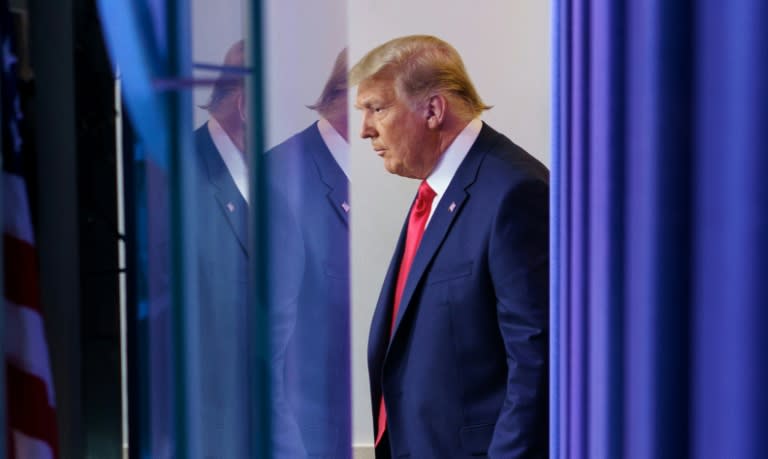US high court hears challenge to law used against Trump, Capitol rioters

- Oops!Something went wrong.Please try again later.
- Oops!Something went wrong.Please try again later.
- Oops!Something went wrong.Please try again later.
A divided US Supreme Court heard arguments on Tuesday in a case that could lead to the dismissal of some of the charges filed against former president Donald Trump and hundreds of his supporters who took part in the January 2021 attack on the Capitol.
Special Counsel Jack Smith has slapped the 77-year-old Trump with four felony charges related to efforts to overturn the results of the 2020 election he lost to Democrat Joe Biden.
Several of the conservative justices on the nation's highest court appeared to be skeptical on Tuesday of the filing of obstruction charges against Trump and other participants in the assault on the Capitol.
The Republican presidential candidate is charged with conspiracy to defraud the United States, conspiracy to obstruct an official proceeding and obstruction of an official proceeding -- the session of Congress held to certify Biden's victory.
Trump is also charged with conspiracy to deny Americans the right to vote and to have their votes counted.
Joseph Fischer, a former police officer, is among hundreds of Trump supporters facing or convicted of obstruction charges and is seeking to have them tossed out, which could have a knock-on effect for all of the cases -- including Trump's.
A district court judge, a Trump appointee, agreed to dismiss Fischer's obstruction charges on the grounds the law used was intended to prosecute financial crimes -- specifically the destruction of documents during the 2001 Enron scandal -- and did not apply to his conduct on January 6.
That ruling was reversed by an appeals court in a 2-1 decision.
The Supreme Court, which has a 6-3 conservative majority, including three justices nominated by Trump, devoted 90 minutes to hearing Fischer's appeal.
Jeffrey Green, Fischer's attorney, told the justices that "attempting to stop a vote count or something like that is a very different act than actually changing a document or altering a document" as the law was applied in the Enron case.
Justice Sonia Sotomayor, a liberal, pushed back against Green's reading.
"There is a sign in the theater -- you will be kicked out of the theater if you photograph or record the actors or otherwise disrupt the performance," Sotomayor said.
"If you start yelling, I think no one would question that you can be expected to be kicked out under this policy.
"It's not the manner in which you obstruct, it's the fact that you've obstructed."
- Immunity claim -
Justice Neil Gorsuch, a conservative, expressed concerns with the potential application of the law.
"Would a sit-in that disrupts a trial or access to a federal courthouse qualify?" Gorsuch asked. "Would a heckler in today's audience qualify?"
"Are those all federal felonies subject to 20 years in prison?"
Solicitor General Elizabeth Prelogar, representing the government, said the examples were not comparable with what happened on January 6.
"It's in a fundamentally different posture than if they had stormed into this courtroom, overrun the Supreme Court police and required the justices and other participants to flee for their safety," Prelogar said.
In Fischer's case, she said, he "specifically intended to prevent Congress from certifying the vote and so used his actions to obstruct that proceeding."
Prelogar also noted that of the 1,350 people charged in connection with the Capitol riot, only around 350 were charged with obstruction.
The court is expected to issue a ruling by the end of its term in June -- four months before the November 5 election in which Trump is expected to face Biden again.
Trump's trial on the election interference charges had been scheduled to begin on March 4 but is on hold pending a Supreme Court examination of Trump's claim that as a former president, he is immune from criminal prosecution.
The court is to hear arguments on the immunity claim, which has been dismissed by two lower courts, on April 25.
There are a total of four criminal cases hanging over Trump and jury selection began in the first one in New York on Monday.
In that case, Trump is accused of falsifying business records in a pre-2016 election scheme to cover up an alleged sexual encounter with a porn star.
Trump's lawyers have sought to delay his court cases until after the election, when he could potentially have the federal charges against him dropped if he wins.
cl/sms

